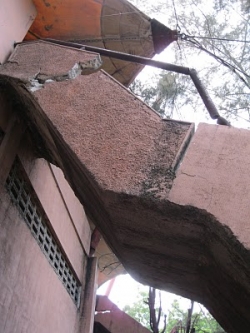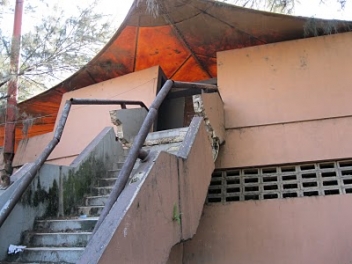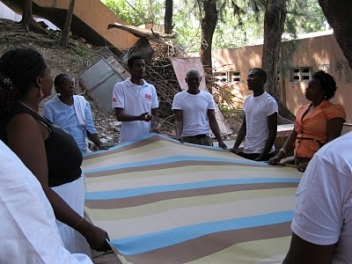 This was my final day in Haiti.
This was my final day in Haiti.
We trained an excellent group of Friends (trained volunteers some of whom are older people) today and had just the right number so that they could work comprehensively in small groups with their facilitators.
Crumbling conditions
We were in a horrific camp in Port-au-Prince. We were first directed to a tent that was full of garbage and had no seating. The camp manager then directed us to the basement of the old city theatre that sat in the middle of the camp.
The earthquake had split it down the middle, and it still looked like it was in a somewhat precarious position. The basement area looked safer than the patio area, but it had a such stench and such a thick layer of dust and grime that the nurses and Steve all started having allergic reactions – itching and respiratory.
The Friends didn’t seem to be bothered at all, they’re probably used to it more being camp residents. We powered our way through the didactic part and then did the practices out on the patio amongst rubble and rebars and a huge crumbling column over us.
Stabilisation from trauma
 The Friends were remarkably enthralled by the work. At first they talked about just needing more cash to give to their older people so they would have food, but they finally agreed that they had something incredibly important to give them in helping them stabilise themselves from trauma upon trauma.
The Friends were remarkably enthralled by the work. At first they talked about just needing more cash to give to their older people so they would have food, but they finally agreed that they had something incredibly important to give them in helping them stabilise themselves from trauma upon trauma.
They were receptive and hungry to do their own work and grateful that we were there for their own care. They made a good first pass on the skills and want more training soon. One woman was struggling with heart palpitations, agitation and anxiety that were re-activated by her fear of Hurricane Tomas last week.
Help is the only hope
In the trauma work, I helped her focus on the sensations in her body when she remembered a day in May when a clean water source finally arrived at the camp she had just migrated to. More specifically, she remembered the sensations of the cool water running through her when she could finally drink, and feeling the water on her hands as she was able to wash her clothes and her dishes. Working with this resource helped her neutralise the activation of fear that a tree would crush her tent in hurricane winds, and her body settled to a calmer, more balanced state…
Help coming is the only hope for these most vulnerable people.
Lifeline to older people
 The HelpAge model here in Haiti has been such a palpable lifeline for older people here who have lost everything in the earthquake; their homes, their livelihood, sometimes their spouse or a child. Now they live in Internally Displaced People camps often with no family around or a grandchild or two that is solely in their care, a leaky tent, noise and violence everywhere.
The HelpAge model here in Haiti has been such a palpable lifeline for older people here who have lost everything in the earthquake; their homes, their livelihood, sometimes their spouse or a child. Now they live in Internally Displaced People camps often with no family around or a grandchild or two that is solely in their care, a leaky tent, noise and violence everywhere.
What I heard from the Friends over and over was that older people in the camps rely on HelpAge being there. They have helped older people get clean water, intermittent cash for food, microcredit grants to start up a small business, respite from the oppression in the camps on monthly field trips and education about what to do to prevent cholera and what to do if they get cholera symptoms.
Healing asset to Haiti
The Friends visit their each of their 20 plus older people beneficiaries often twice a day, assisting with personal care when needed, giving them the latest information about security and health issues, and being a support. Now almost 100 of the 200 Friends have been trained in a trauma model which promotes psychological resiliency. The Friends also have a means of earning a living as they themselves are getting back on their feet with the part time salary HelpAge pays them.
They get to be a healing asset for their country. This HelpAge structure made it possible for many people to be reached. I am amazed and inspired to see what American dollars from AARP and HelpAge International can buy. It is quite stunning.
So off to bed and to catch an early plane out in the morning, very tired after a long couple of weeks, but so honoured and privileged to be a part of all this.
Read more about HelpAge’s work in Haiti
Visit Stephanie’s blog about her experience working with HelpAge in Haiti
